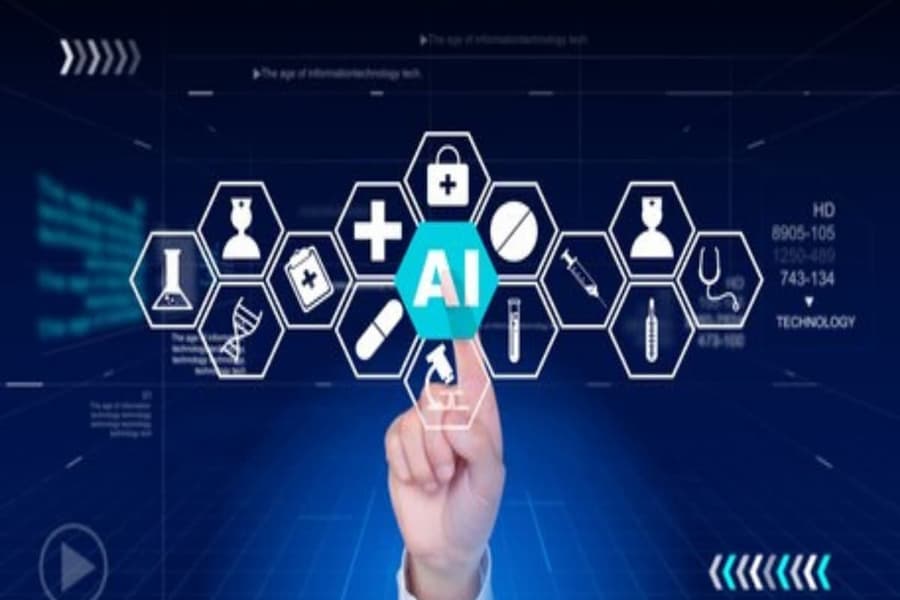Due to the rapid advancement of healthcare technologies, it is now possible to imagine a world where single point interaction health systems can exist. With the AI technology, the smart personal caregivers, intelligent patient engagement tools, and intelligent healthcare systems, the service provision and user experience has been enhanced, making it simple for healthcare providers to AI value-based services users. AI technology is making its way into every field, including the intelligent operations of the healthcare sector. The providers of health care and intra health service delivery stakeholders are indeed working smart.
Some significant virtual AI tools in healthcare are AI System Dynamics, telemedicine consults, and symptom checkers. These tools in healthcare services are referred to as bespoke healthcare software. These systems allow for the development of better and more advanced diagnostic and therapeutic methodologies and relieve physicians from the additional burden from the administrative and operational systems. Thus, the marriage of telemedicine and AI has overhauled the paradigm of the delivery and access of medical services and requires Jeff Dean.
Generative AI Integration in healthcare assistants have completely revolutionized the healthcare industry. These software applications enable their users to take care of their health, conduct virtual checkups and schedule or set medication reminders. The software programs proficiently receive queries from patients and respond with the best possible real-time solution via natural language processing (NLP) and machine learning (ML). Here are a few highlights regarding AI enhanced virtual healthcare assistants:
- AI healthcare assistants are ever present: AI healthcare assistants are not bound by time and can be reached at any moment. AI technology in the healthcare industry allows patients to avoid waiting or making an appointment with a qualified practitioner.
- Reminders for Medication: Sending alerts to the patients for taking prescribed medication or for attending medical appointments is another Artificial Intelligence (AI) powered healthcare assistant function. This feature could prove beneficial for chronically ill patients to ensure compliance and follow-up care attendance.
- Symptom Checkers: AI powered healthcare assistants fitted with AI symptom checkers allows patients to enter their symptoms and receive possible health risk diagnoses.
It may help the patients understand if it is essential for them to visit the doctor’s office, or if the situation can be taken care of at home.
Thanks to AI technology, you are always on schedule because they provide medication reminders for timely treatment dosage. You’ll also get Medication Management features with this advanced technology.
This smart technology is able to process a physician’s files and adjust the expected regimens and needed therapy, exercise and diet for more effective treatment. They’re also capable of making Personalized Health Recommendations.
The Benefits Intelligent tools for Patients:
Treatment for patients has greatly changed for the better, especially in medicine because of the latest advances in technology. With the use of intelligent tools for patients in the ecosystem, the medical team can monitor the health of the patients, collect medical data, and even predict problems before they happen. These tools offer the ability to disseminate information as it is being generated in the system, thus enabling the treatment team to respond to the issue and prevent it from progressing. There are numerous advantages of intelligent tools for online patients:
- Continuous Monitoring of Health Metrics enables the patient to keep track of the medical health indicators such as heart rate, blood pressure, glucose, etc., and manage them in real time. This helps the healthcare providers to have an idea on the health condition of the patients in a bid to limit the frequent in-person consultations.
- Recognizing Health Problems Ahead of Time: These devices come with the advantage of AI algorithms that analyze data to better detect possible future risks to one’s health. For example, if a patient has high blood pressure, they might be sent a notification when their pressure reaches a certain level. This is the time where a patient should seek help from healthcare providers. When such issues like heart strokes or attacks are treated before they’re allowed to escalate they are far to a lesser extent severe to treat, thus making them far easier to deal with due to the simple fact that they were detected early.
- Patient Supervision From Afar: Intelligent patient tools tend to go beyond just enabling patients to check and track their health using portable devices. They also allow the monitoring and treatment of people suffering from chronic conditions remotely. The patients do not have to attend the clinic regularly for monitoring purposes anymore.
- This structure allows the health care service providers to pace their treatment regimes to the practitioners knowing that they have the real time information of the patient’s condition at hand. Thus the practitioners are able to modify the treatment during the time in which the patient is taking the prescribed medications. The patient is simply monitored remotely while the practitioner rgs are able to adjust the treatment.
- Better Patient Involvement: In these scenarios, the patients take part in their own wellness management. With the appropriate technology, they can self-monitor their diseases, comprehend more, and consequently make choices that are more favorable.
- Smart Medical Platforms: Solutions That Need Adequate Attention From Providers Of Healthcare Services
It is true that smart medical platforms are not key in providing an integrated and efficient healthcare solution. The Smart medical platforms integrated for use with smart healthcare infrastructure makes it possible to integrate various healthcare systems such as electronic health records, diagnostics, and even clinical management systems. Along with many other functionalities, smart medical automation systems contribute to service delivery by improving workflow processes, reducing the occurrence of errors in processes done by human beings, and optimizing patient care in the health care service industry.
The following are some of the characteristics smart medical platforms possess:
- Health Record Data and Imaging Information: Smart medical platforms have the capability to automatically capture and integrate data from different sources that are unconnected and unconnected such as medical, imaging, and laboratory results, among others. Chatgpt integration enables healthcare professionals to have an extensive view on a patient’s health issues, leading to timely and effective solutions to their medical problems.
- Automated Documentation: Paperwork prepared by healthcare practitioners is perhaps the most tiresome of all. But thanks to modern AI-powered medical technologies, it has become a walk in the park. They somehow manage to attend to the excessive burden of documentation with such ease. As a consequence, real healthcare professionals can focus on treating patients instead of dealing with piles of paperwork.
- Interspecialty Collaborative Care: For these multidisciplinary specialists, it is very easy to access and share patients’ data which enables them to provide comprehensive and well-coordinated care to the patients. The outcome of this kind of procedure is always better health results.
- Scalability Any person will tell you that scalability means employing or utilizing the same system at large and small hospitals and clinics alike. In fact, these systems are suitable for small practitioners and large hospital networks.
Easy Patient Support with the Virtual Healthcare Platforms:
These are coming up as a necessary part of modern healthy health care. These platforms assist patients in obtaining health care services without stepping into the health facility. Now, using sophisticated telemedicine systems where patients securely talk or text doctors, virtual consultations can be held from the comfort of one’s home.
The healthcare systems worldwide are experiencing a virtual transformation; as long as users are able to access the internet, health services can be availed without any geographical restrictions. These platforms undoubtedly enhance the whole experience of healthcare. Some of these attributes include the following:
- Remote Consultations: Patients can send messages or make video calls to their doctors. This makes dealing with healthcare easier. These services are most effective for people in remote locations or with limited access to healthcare professionals.
- Integrated Care: Everything from prescription to diagnosis and even appointment making can occur on one platform. So, new age patients with these modern digital healthcare systems do not struggle to receive multiple […]
- Cost-Effective: Patients prefer receiving medical consultation from the comfort of their home instead of attending physical consultations. Providers, on the other hand, also benefit. They cut down on the medical office upkeep and employee salaries, which lowers their operational costs and boosts profit.
AI in Telehealth: Improving Accessibility and Effectiveness of Health Services:
The use of telehealth services skyrocketed during the pandemic of covid as patients wanted remote health services. The use of Generative AI coupled with the technological development of Generative AI makes telehealth more efficient. This implies that many of the tasks that physicians need to do like invoicing, scheduling, and relaying patient’s information can now be transferred to AI systems.
For instance, automated healthcare services users on Platforms can receive virtual services from chatbots that are integrated with GPT Chat like with other AI models that can respond to needed questions, offer assistance or even evaluate a patient’s symptoms. Simple and routine tasks that healthcare providers do not need to use their expertise are now supported with AI-based Symptom Checkers. This way, healthcare practitioners can treat those patients who need medical help more.
The Impact of AI on Medical Professional Workload:
AI tools alleviate the burden of both clinical and administrative work for medical practitioners. Usually, tasks like data entry, report generation, appointment scheduling, and other such activities are rather monotonous and require significant amounts of time. AI is effective at completing these tasks in much less time. In fact, studies indicate that the adoption of medical automation systems can reduce workflow time in a medical practice by as much as fifty percent. This leads to an easing of the administrative burden by 30% and improves the ability of providers to look after more patients.
AI tools have the potential to improve clinical decision making as well. Base on the analytics output, AI generates recommendations to assist the – evidently from – patient data. This mitigates the risks of undertaking medical procedures, ensuring quality medical care is provided to the patient.
The Impact of Virtual Healthcare Services on Patient Health Outcomes:
Patients and healthcare providers should benefit from the above-mentioned services. For instance, when these AI-based symptom checkers are employed, the patients are able to self-evaluate their health status and determine whether they need more advanced medical treatment. This lessens the issue of unnecessary self-referrals to health facilities.
There is improvement on the continuity of care from the angle of virtual healthcare systems. Care gaps are filled and health outcomes improved since patients are able to monitor their treatment from a distance. With advanced decision support tools, healthcare facilities have remote access to up-to-date information enabling them to close the gaps with smart decision support systems.
Evolution of Health Care Strategies:
The development of A virtual healthcare assistant, intelligent medical technologies, and advanced patient applications are likely to drive the growth of this field. These technologies can potentially improve the services offered to patients, Help reduce the workload of many other health practitioners, and improve the overall effectiveness of the healthcare system. Some of the essential solutions are:
- Personalized Medicine: Sophisticated AI applications make it possible to examine data closely, thus allowing specialized care and other healthcare recommendations to target a specific patient. This emphasizes on the service to the patient, while the patient’s wellbeing is prioritized.
- Remote Patient Monitoring: Healthcare service providers can now use advanced patient care devices to observe the progress of patients from any location, thus enabling modification of treatment plans in a timely manner.
- Enhancement of Reach: Through virtual health caring services, healthcare is more accessible to geographically remote and underserved regions. Even those in the rural areas will be able to get assistance from qualified doctors regardless of where they are situated. Healthcare will be made available to all.
Conclusion:
Innovations in AI health assistants, patient-centric intelligent devices, and self-operating medical platforms are relevant to the advancement of the “revolution in virtual healthcare” and transforming how care is delivered. With the rise of the latest generative AI development as well as ChatGPT, doctors and other healthcare providers will be able to offer more effective, personalized, and easily accessible care. These innovations improve patient outcomes and enable healthcare professionals to focus on many more important tasks and demands to make this healthcare system effective and sustainable. Such developments will guarantee that healthcare is accessible, affordable, and effective to people across the globe.
Visit classicstylemag for more informative blogs.



